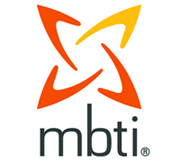Using MBTI® Type to Foster Individual Development
Using MBTI® Type to Foster Individual Development
Remember: While every type has its unique combination of assets, each is also subject to a downside due to potential overuse or rigidity. Continue to leverage your strengths and the strengths of others but seek opportunities to address developmental needs and grow professionally.
- To Extraverts: “Practice Introversion by counting to 10 when you’re feeling especially action-driven or enthusiastic, or reflecting on ideas and plans to fully consider them before acting.”
- To Introverts: “Practice Extraversion by soliciting input from others and seeking assistance with formulating plans, even if you prefer to approach the task independently.”
- To Sensing types: “Practice Intuition by creating a one- to two-page executive summary describing the trends or patterns suggested by the data under consideration.”
- To Intuitive types: “Practice Sensing by using precise, accurate details in a report or project that you don’t believe merits such information.”
- To Thinking types: “Practice Feeling by moving outside your normal range of conversational topics to share some personal facts, details, or insights about yourself.”
- To Feeling types: “Practice Thinking by purposely giving simple, direct, and concise feedback to others.”
- To Judging types: “Practice Perceiving by scheduling one day a month at work to “go with the flow” and noting any value that such flexibility brings.”
- To Perceiving types: “Practice Judging by determining what daily tasks you could do consistently and then developing a routine and sticking to it.”
-
- What behaviors would you like to start, and how might you begin making small steps toward making the requisite changes?
- How might you track your progress to determine what new behaviors or approaches are making a positive impact? Now, consider your own type preferences and how they relate to the way you approach your daily tasks and progress toward your professional goals.
Source: Adapted from Hirsh and Kise, Introduction to Type® and Coaching (1998), pp. 13–14, www.cpp.com
More From Michele
Why Personality Type training can be effective?
, Personality Type training can be effective for a variety of reasons: Leadership Development: Knowing your inherent strengths and limitations is a vital part of effective leadership. Through targeted training, learn how to recognize your instinctive leadership...
Benefits of Practicing Relaxation Stress Management
Practicing relaxation exercises 20-30 minutes on a daily basis can produce, over time, a general feeling of relaxation and increased well-being that benefits every area of your life. With regular practice, you feel more in control, which leads to calm, realistic...
When God Pushes Us Through Our Fear
When I'm facing difficult times and feeling “super challenged", it would be easy to scream out in fear, "Good Lord why me"? Instead, I remind myself of my love for my children and His love for His children. I'm reminded of a time when my middle child wanted to learn...




